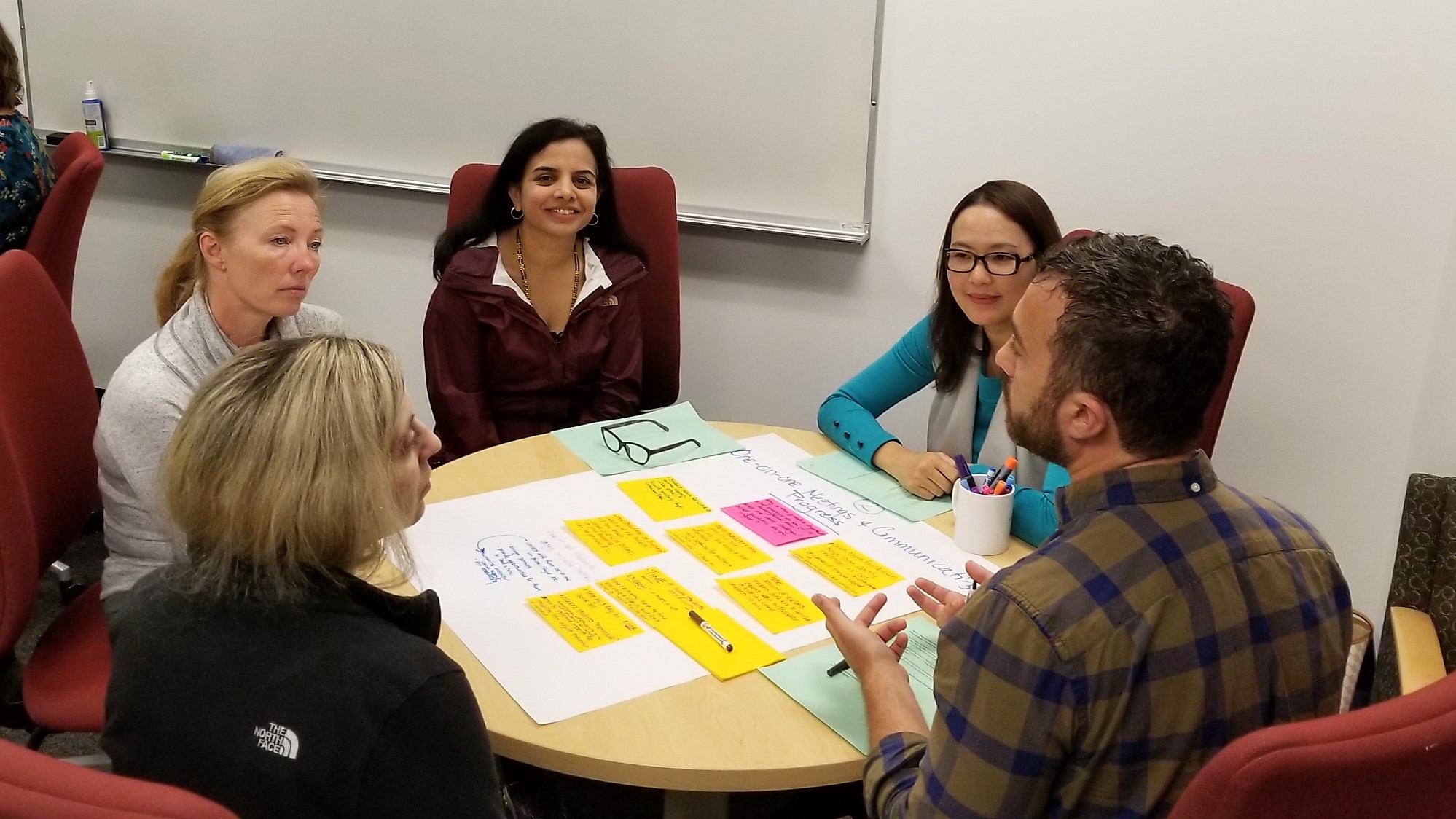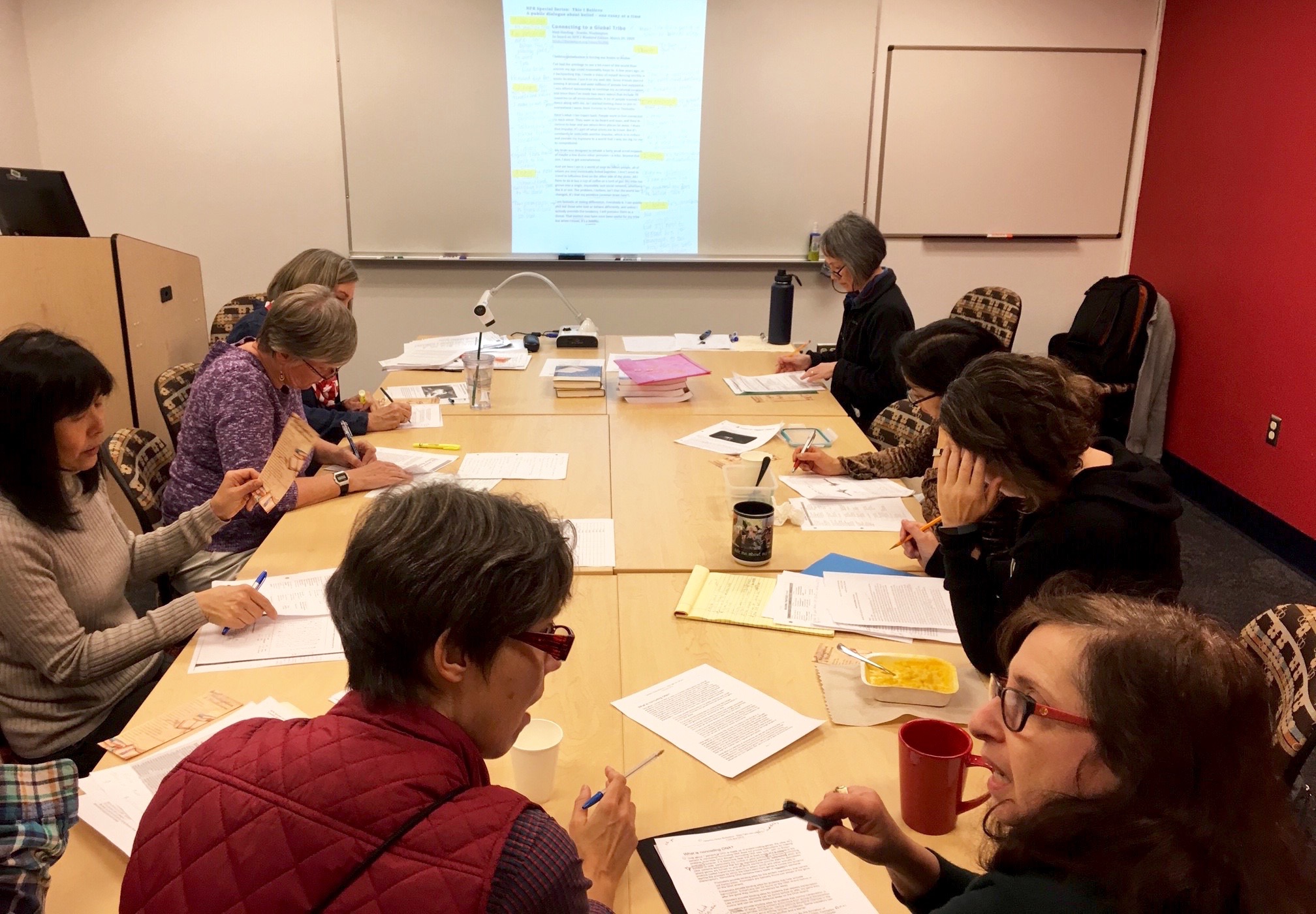
We are thrilled that 13 faculty have now completed the full Academy! That is at least 75 hours of committed engagement in professional learning. And, faculty have engaged in 3,625 PD hours since its inception. Will you be next? You might be new to college instruction or have been teaching for years – these workshops are made for you! We identified key elements of equitable college teaching, learning, and assessment and divided those into 3 strands: Nuts and Bolts of College Instruction, Student Engagement, and Transparent and Relevant Assessment. Participants will come away with a theoretical understanding of the topics and practical applications of these integral elements of teaching for your courses.
Sign up for one strand this quarter; make a plan to complete all 3 over time.
Each strand offers participants the opportunity to earn:
- 25 PD Hours
- $600 stipend for completing all online work and attending a minimum of 3 remote sessions.
- Completers of the entire Academy will receive a special certificate.
To sign up or to learn more about these workshop strands, please contact Sajonna Sletten, the Faculty Commons Chair.
Nuts and Bolts of College Instruction – Fall
Are you new to teaching? Or do you want to revisit some of the foundations of college instruction related to teaching and learning? The Nuts and Bolts workshop engages faculty in learning and discussions about the fundamentals of being a college instructor, while making practical applications to your courses. Throughout these sessions we introduce evidence-based strategies and intertwine equity, cultural responsiveness, and growth mindsets as we discuss our syllabi, course outcomes, lesson plans, assignment creation, and student support strategies. This workshop is designed to provide faculty with an overview of the topics below. Faculty may discover areas they wish to explore further in more specific workshops.
In this strand, we explore:
| Culturally Responsive Teaching | Examine how our positionality, implicit biases, and cultural lens impact the students in our classroom. Work to be anti-racist instructors. |
| The Inclusive Syllabus | Examine the role of instructor presence right from the start of the quarter through paying attention to tone and language used in the first touchpoint we have with our students – the syllabus. |
| Connecting Outcomes to Performance | How can we structure our class with the outcomes in mind and meet those outcomes using traditional and alternative assessment strategies? |
| TILT Assignment Framework and Student Success | Use the TILT Assignment Framework to revise one assignment, making the “why and how” behind each assignment clearer for our students. |
| Universal Design for Learning | Share ideas for lesson planning and delivery with a focus on Universal Design for Learning (UDL) and explore Equity/Growth Mindset |
| Partnering with Student Support Services | Learn ways faculty can partner with key student service providers on campus (e.g. Counseling, Disability Resource Center, Advising) to be in compliance and to enhance student learning and support). |
| Significance of Reflection | Build student reflection and your own instructor reflection into a regular practice to add depth to learning in the classroom. |
Learning Outcomes:
Participants in this workshop will be able to:
- Articulate how positionality and implicit bias impact our classroom environment and how to create a more equitable classroom.
- Identify and apply culturally responsive strategies in their classes.
- Identify the components of an inclusive syllabus and construct one for their courses.
- Construct and revise one assignment using the TILT assignment framework to enhance clarity of expectations for students.
- Understand and apply the Universal Design for Learning (UDL) principles to all facets of their teaching and classroom environment.
- Describe the importance of reflection in learning and create reflection activities.
Student Engagement -Winter
No matter how long you’ve been teaching, this transformational offering is for you! Why? We know that an engaged student is much more likely to succeed in college. The Student Engagement Strand centers on active learning and community building in the classroom. The strand begins with an interactive investigation of the most current research on how we learn and then uses that brain research as a foundation for workshops on cultural responsiveness, community building, tech tools for engagement, and enhancing one’s presentation style. Collaborate with your colleagues while building your toolkit for engaging your students in their education.
In this strand, we explore:
| How People Learn | Brush up on the basics of how people learn, including brain research, metacognition, and equity. |
| Cultural Responsiveness | Dive into what it means to be a culturally responsive instructor. Explore your own positionality and culturally responsive practices so you can create an equitable classroom where all students’ voices and experiences are represented. |
| Universal Design for Learning | Design assignments that allow for multiple means of engagement, action and expression, and representation. |
| Engagement and Intervention Strategies | Learn about the different strategies and tools you can use for on ground and online courses to monitor student engagement and intervene to promote student success. |
| Implementation/Application and Reflection | Apply what we learn to your courses throughout the workshop and reflect on what works and what to do next. |
Learning Outcomes:
Participants in this workshop series will be able to:
- Articulate how positionality and implicit bias impact our classroom environment and how to create a more equitable classroom.
- Identify and apply culturally responsive strategies in their classes.
- Identify the components of an inclusive syllabus and construct one for their courses.
- Construct and revise one assignment using the TILT assignment framework to enhance clarity of expectations for students.
- Understand and apply the Universal Design for Learning (UDL) principles to all facets of their teaching and classroom environment.
- Describe the importance of reflection in learning and create reflection activities.
Transparent and Relevant Assessment – Spring
As instructors, we all realize the importance of assessment when it comes to student learning and success. Have we considered, though, the purpose and impact of the traditional grading system, and considered alternatives? Do we take the time to make sure we are assessing what students need to know in a way that is relevant and transparent to our students? The Transparent and Relevant Assessment Strand of faculty development focuses on a variety of creative and relevant strategies to assess student learning. Sessions include how to provide meaningful feedback, write assignments and rubrics that are transparent for our students, use a variety of classroom assessment techniques, including giving students a voice in their education.
In this strand, we explore…
| Assessment Overview, Backwards Design, and Higher Order Thinking | Reflect on our thoughts on the “what” and “why” of assessment. We will spend time learning about Backwards Design and designing your assignments to engage and assess higher order thinking, with a focus on authenticity. |
| Purpose and Types of Assessments | Differentiate the three purposes of assessments: Assessment of learning, assessment for learning, and assessment as learning. Also, explore the different types of assessments, including diagnostic, formative, summative, and ipsative. All of these could be used to illustrate student learning and needs in the classroom. |
| Grading | Explore the context of grades, the impact of grades on learners, and some new considerations to grading such as Ungrading, Alternative Grading, and Specifications Grading. |
| Rubrics and Quality Student Feedback | Discuss how to design and use rubrics for all assignments. Learn how to provide quality feedback to students that can assist them in their future assignments right from the start of the quarter. |
Learning Outcomes:
Participants in this workshop series will be able to:
- Identify and apply culturally responsive strategies in their classes.
- Articulate multiple beliefs about the purpose of assessments.
- Identify higher orders of thinking in assessments.
- Improve the transparency of relevance and the clarity of language of an assessment.
- Update a rubric to improve the quality of feedback.
- Describe the importance of reflection in learning and create reflection activities.

Last Updated August 21, 2023
